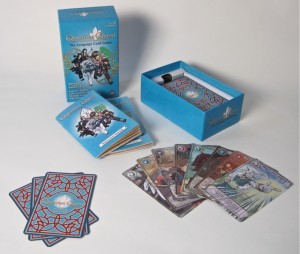Review: Question Quest The Language Card Game
We’ve been trying out Question Quest for the last few weeks at Cambridge English.
We love AGO, the UNO-like simple English question game, and David Lisgo’s Switchit card games.
When I saw Question Quest’s website I was extremely interested. It seemed like it would appeal to our teenage learners and complement our existing card games so I ordered a copy immediately.
Once it arrived I was impressed with the production values. The game is very attractive, with incredible artwork, quality materials, and a sturdy box.
The good
- The artwork is beautiful and very appealing to Japanese teenagers
- The game includes English and Japanese instructions
- The materials are high-quality and pretty sturdy
- The language covered is very appropriate for our students
- Cards include example sentences to help students
- The gameplay is interesting and more skilled players are more likely to win
- Students practice strategies such as asking for more information, asking a third party, and expressing their lack of understanding
- Reasonably priced (1575 yen for over 100 cards)
The bad
- The game as written takes a long time to play (probably 20-40 minutes), which was a bit long for us
- It took a while for us to understand the rules, both teachers and students
- Some of the example questions on the cards are a bit unintuitive
Overall
This is a very promising resource. We normally do some kind of game or activity in the last 5-10 minutes of class, so found that Question Quest did not quite fit in that time. However, we were able to adapt the game (teacher asks the questions to students, playing without the conversation strategy cards, etc.) to fit the shorter time.
We also took some time and played some full games. Lots of fun and the students are practicing useful conversational gambits.
Overall I recommend Question Quest to teachers of teenage or young adult students (although it would certainly work with the right group of adults too). It’s an attractive and versatile resource. A single pack is a very reasonable investment for a small classroom: teachers with larger classes would need one set for each group of up to 4-6 players.
Has anyone else tried this game?
Three things
A new type of post for you today: the roundup.
I had a short op-ed piece on language teaching published in the TESL Ontario magazine, Contact. It’s on p.51 and the index is clickable 🙂
Last week saw the beginning of a new project: Retire Japan. It’s a website, blog, and Facebook page that provides information about saving, investing, and ultimately retiring in Japan for long-term residents. I’ll be doing all my financial writing over there from now on, so please like the FB page or subscribe to the newsletter if you are interested.
My university is looking for university teachers to contribute a chapter to a book aimed at new university faculty and offering advice about work/life balance, getting off to a good start at university, etc. If you are interested in writing around 4 A4 pages in English or Japanese for this project please drop me a line.
No more presentations (for now)
Right now I only have one presentation scheduled: Sendai JALT on January 23rd.
That’s actually quite a strange feeling. The last couple of years have been great for me in terms of chances to present. I’ve been all over Japan and met all sorts of great people. You can see some of the presentations on the Sendaiben Youtube channel.
However, I have started to feel a bit burned out. In 2014 I will be attending some conferences as a participant, not a presenter. I’ll also be working on some really exciting new projects (stay tuned for more information soon).
I hope to be doing a lot more writing next year, on this blog and elsewhere.
Collaboration Arithmetic
Recently I have been working a lot with one of my colleagues at my university.
A lot of the time, working with others is a drag on effectiveness. Things take longer to get done, you need to agree on what to do, people don’t do their share. It tends to be 1+1 ends up being less than two, and for every person you add to the mix the final number gets lower and lower. After a certain point the results drop to zero.
However, once in a while you end up with a team that works. Synergy occurs as your complementary skill sets allow you to do things that you couldn’t do by yourself.
In that rare situation, 1+1 ends up being 3 or 4 or 5.
We have a new project in the works, and I think you will like it. More details in 2014.
In the meantime, if you don’t have a copy of our ER Program Design Manual, why not order a free copy from our Center for Professional Development?
Have you ever had a synergistic collaboration?
Another Excellent Talk on Creativity
At the Oxford Day this year, I really enjoyed talking with Goodith White.
During her keynote, she mentioned this speech by Paul Collard, which I then tracked down and found excellent. He has some interesting points on teaching, test scores, and educational systems in Japan and Korea:
Lots of takeaways for language teachers. Some of the standouts for me:
- teachers need to train students to learn outside of the classroom
- our students are going to have to make their own jobs
- students that are pushed to achieve high educational test scores often end up disliking the subject and not pursuing it in the future (English in Japan?)
- autonomously functioning (self-directed) students do much better at university or in the workforce
What did you think of the speech?



